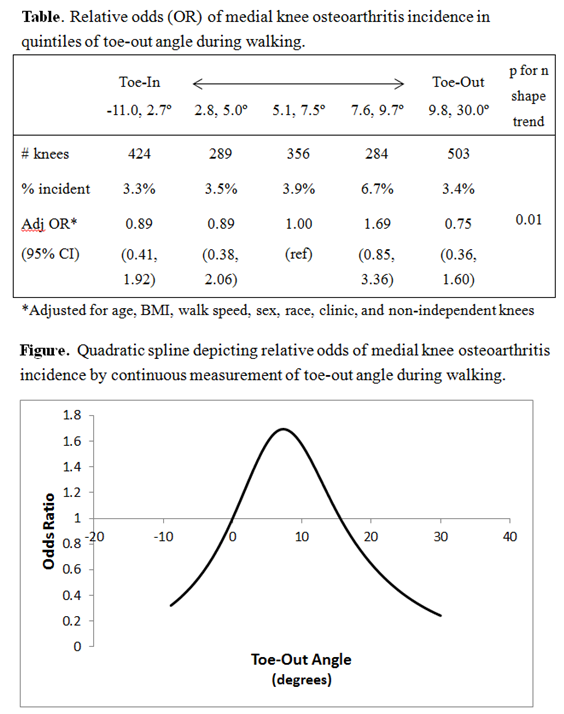Session Information
Session Type: Abstract Submissions (ACR)
Background/Purpose: A previous study suggests a linear relationship between increased toe-out angle during walking and reduced risk of medial knee OA progression. Yet, gait lab findings indicate that both highly positive (toe-out) and negative (toe-in) angles can reduce medial knee load. The relationship of these angles with medial knee OA incidence has not been studied. We assessed the dose-response relationship of toe-out angle during walking with 2-year risk of incident medial knee OA.
Methods: The NIH-funded Multicenter Osteoarthritis Study (MOST) includes adults aged 50-79 years that have or are at risk of knee OA. Among 60-month participants, mean toe-out angle was measured during 4 self-paced walking trials using a 4.9 meter GAITRite walkway (14-day retest ICC = 0.95). Readers scored medial joint space narrowing (JSN) on semiflexed knee x-rays using OARSI grades (weighted κ = 0.81). Among knees with medial JSN grade 0 at 60 months, incident cases had medial JSN ≥ 1 and > lateral JSN grade at 84 months. With the middle quintile as a reference, logistic regression estimated the relative odds of medial OA incidence in each case-based quintile of toe-out angle while adjusting for age, BMI, walking speed, sex, race, clinic site, and non-independent knees of a single subject. We used a quadratic spline to smooth the curve and obtain a clear picture of the dose-response relationship. In sensitivity analysis, knees with pain during the walking exam were excluded.
Results: 1112 participants (mean age 66.6 +/- 7.6 yrs, BMI 29.6 +/- 5.3 kg/m2, walking speed 1.19 +/- 0.19 m/sec , 61.1% female, 88.0% white, 55.7% Iowa clinic) contributed 1856 knees with a mean toe-out angle of 6.7 +/- 5.4º (range -11.0, 30.0º). After adjustments, the relative odds of incident medial knee OA had an n-shaped relationship with toe-out angle (p for trend < 0.01), such that the highest (9.8 to 30.0º) and lowest (-11.0 to 2.7º) quintiles had 11-25% reduced odds compared to the middle quintile (5.1 to 7.5º) (see table and figure). Results were unchanged in sensitivity analysis (p for n-shaped trend = 0.03).
Conclusion: These results suggest that both highly positive (toe-out) and negative (toe-in) angles during walking are protective against medial knee OA incidence. Clinical trials should determine if gait training to alter toe-out angle is effective in preventing medial OA onset in at-risk knees.
Disclosure:
K. D. Gross,
None;
Y. Zhang,
None;
E. K. Quinn,
None;
M. C. Nevitt,
None;
N. A. Segal,
None;
C. E. Lewis,
None;
D. T. Felson,
None.
« Back to 2013 ACR/ARHP Annual Meeting
ACR Meeting Abstracts - https://acrabstracts.org/abstract/the-relationship-between-toe-out-angle-during-walking-and-risk-of-medial-knee-osteoarthritis-incidence-the-multicenter-osteoarthritis-study/

